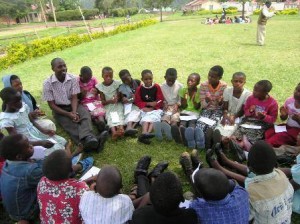Heart Language in Children's Ministry

There are several issues which have proven to be contentious among Christians. One of them involves Pentecost, and the early church experience of speaking in tongues. Amidst the controversy regarding the work of the Holy Spirit, we can easily lose track of one of the central themes of the passage. Luke states it this way:
“Phrygia and Pamphylia, Egypt and the parts of Libya near Cyrene; visitors from Rome (both Jews and converts to Judaism); Cretans and Arabs—we hear them declaring the wonders of God in our own tongues!” (Acts 2:10-11 NIV)
Like today, it is highly unlikely that people traveled the world relying solely on their own local language. Most people traveling to Jerusalem would have been bilingual. In this case, they were “God fearing Jews,” (Acts 2:5 NIV) who spoke Hebrew in addition to their own native language (Acts 2:4 NIV). Their second language skills in Hebrew were likely such that they were able to catch the Galilean accent among the Disciples (Acts 2:7 NIV). It was this unique Galilean accent that had led Jews to associate Peter with Jesus at His trial (Mark 14:70 NIV). Clearly, it was possible to communicate with the entire crowd gathered at Pentecost in Hebrew.
However, the passage makes it clear that each one heard the “wonders of God in our own tongues.” It was God’s desire to communicate to each participant heart-to-heart. Specifically, God did not want to communicate a second language, but rather in the heart language of each person.
The Heart Language of a Person is the Language that was Not Learned
Most of you reading this blog post, did not learn English. Our first thoughts and expressions as tiny children were formulated in English. It is the language of my heart. My wife and I lived in Poland for ten years, and studied and worked to speak and comprehend Polish. We love Polish, we love hearing Polish, and we miss Polish. Last summer we were able to spend several weeks in Poland speaking and hearing Polish…
However, our Real and Only Heart Language is English
This is a crucial and often violated cross-cultural ministry principle. Real heart-to-heart ministry takes place in the heart language of people. We may communicate biblical truths through a translator or better yet, teach biblical principles in a second language, or even communicate about those principles in a second language. But God’s desire is to communicate His wonders in the heart language of people, especially children.
 This is why developing National Ministry Teams inside a language and culture is so crucial. We can agree about biblical principles in children’s ministry. We can train and develop our National Ministry Team leaders in those principles, BUT, they are the people best equipped to declare those wonders to the thousands of children’s workers in a culture. Those children’s workers can declare the wonders of God to the boys and girls of their own language and culture using biblical ministry principles provided by Every Generation Ministries.
This is why developing National Ministry Teams inside a language and culture is so crucial. We can agree about biblical principles in children’s ministry. We can train and develop our National Ministry Team leaders in those principles, BUT, they are the people best equipped to declare those wonders to the thousands of children’s workers in a culture. Those children’s workers can declare the wonders of God to the boys and girls of their own language and culture using biblical ministry principles provided by Every Generation Ministries.
This seems so apparent, but increasingly ignored by the thousands of short-term ministry leaders traveling the world doing ministry in English. I have yet to see a children’s ministry conference in the U.S. led by missionaries visiting from another country for two weeks, with no ability to speak in English. Conversely, there are thousands of “missionaries” traveling the world teaching in English.
Our EGM leadership cannot learn fourteen languages, however, we can focus on a carefully selected key group of leaders in each of those fourteen languages. We work with them, albeit in English, to develop a deep understanding of key biblical principles for ministry to children. They in turn can declare those principles, “the wonders of God,” in the heart language of thousands of children’s workers. Boys and girls in turn, hear the gospel and experience a new life in Christ, in the language of their precious little hearts.
In His Steps,
Daniel C. Watts
President




